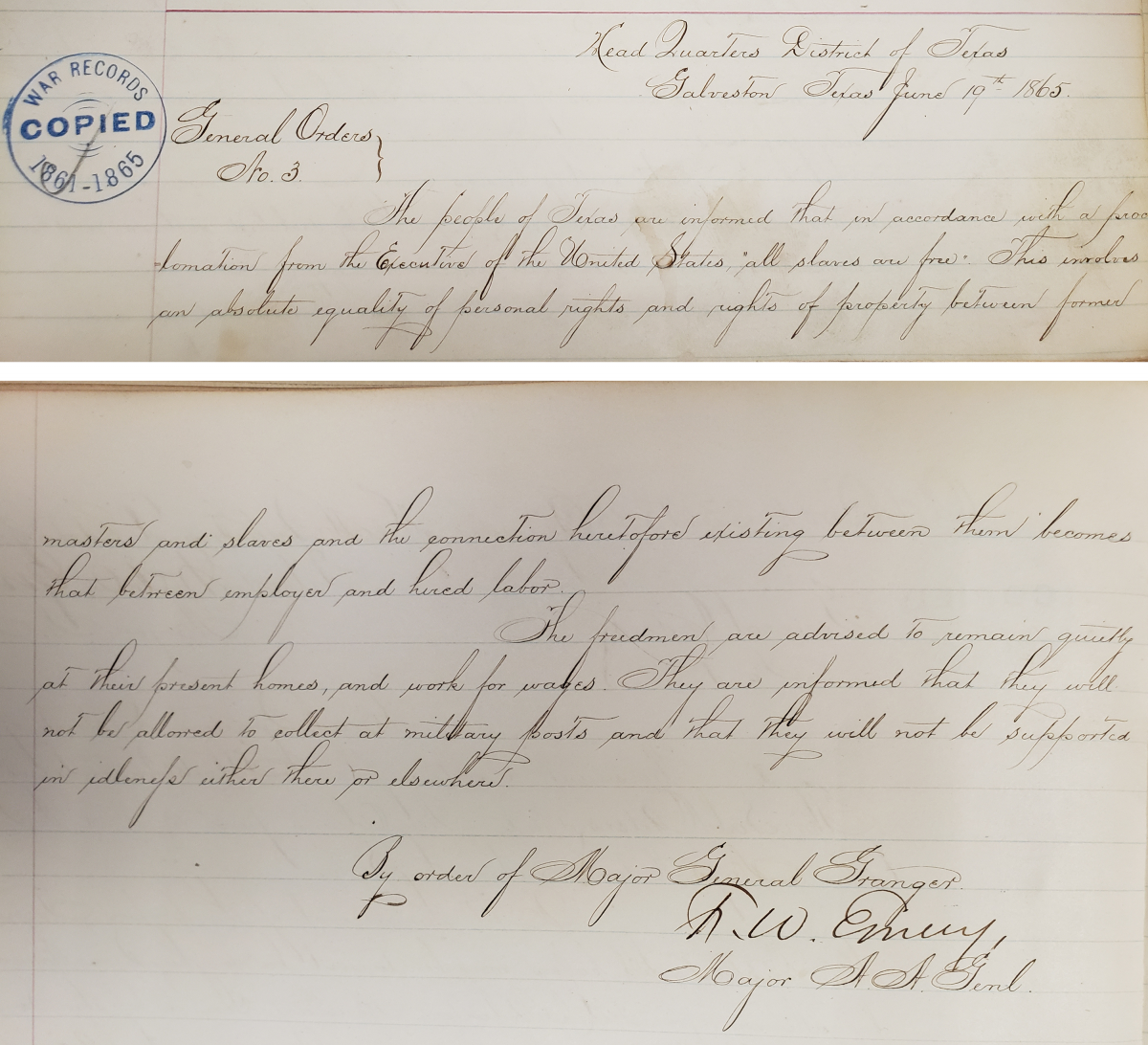
Noted Historian Discusses Juneteenth’s Place in American History
Michael Davis | National Archives News
WASHINGTON, June 9, 2021 — On June 19, 1865, two and a half years after President Abraham Lincoln’s historic Emancipation Proclamation, U.S. Maj. Gen. Gordon Granger issued General Order No. 3, which informed the people of Texas that all enslaved people were now free. This day has come to be known as Juneteenth, a combination of June and 19th. It is also called Freedom Day or Emancipation Day.
On June 2, the National Archives welcomed back Pulitzer Prize–winning historian and Texas native Annette Gordon-Reed to discuss her new book, On Juneteenth, the sweeping story of Juneteenth’s integral importance to American history. The program, presented in partnership with James Madison’s Montpelier, was held virtually due to COVID-19 restrictions.
“Juneteenth is the oldest known celebration commemorating the end of slavery in the United States, but until last year, no one had thought to ask about its documentary origin,” Archivist of the United States David S. Ferriero, said in his introductory remarks to Gordon-Reed’s presentation. “It had long been available and consulted in its printed form, but last summer, a NARA employee’s question led us to the original handwritten order. This landmark document of freedom was digitized and is now in the online National Archives Catalog.”
During the first half of the book talk, Gordon-Reed was joined in conversation by Roy Young, CEO of James Madison’s Montpelier, and Elizabeth Chew, Executive Vice President and Chief Curator at James Madison’s Montpelier.
In addition to highlighting the historical significance of Juneteenth, Gordon-Reed’s book shares the relevant history of Texas and how it relates to her own personal story as a native Texan.
“I’ve thought about writing a book about Texas for a really long time,” Gordon-Reed said. “I write about Virginia and slavery, so why not write about my home state? This past year, during the midst of that pandemic, I was thinking about an article that I had written for the New Yorker about Juneteenth, about the holiday itself, and I talked a little bit about how we celebrated when I was growing up … it made me think a lot about my past. I thought this was a good time for me to write something shorter ... some essays that will allow me to explore Texas history and my family all together.”
Gordon-Reed said when she was younger and living in Texas, celebrating Juneteenth was like celebrating the Fourth of July, but for Black people. When Juneteenth became a state holiday, people of all races celebrated it.
During the latter half of the book talk, two more panelists joined the conversation: the Reverend Dr. Halliard Brown, Jr., a board member of the Orange County, VA, African-American Historical Society, and Mary Furlong Minkoff, Curator of Archeological Collections at James Madison’s Montpelier.
The topics of discussion were related to how African American churches and cultural institutions are celebrating Juneteenth today and their thoughts about how they would like the holiday to evolve nationally in the upcoming years.
“I would like to see it evolve,” said Gordon-Reed. “Where it’s not just a celebration but there would be educational things for young people to find out, to be encouraged to learn about the history of that time of what happened leading up to it and afterwards. I’d like to see it as a fun day but as an educational day as well. I would like to see it continue to be a day, not just for celebration, but a time for thinking about the serious issues that were involved here with the institution of slavery and the problem of racial discrimination. All of that is tied up in this day.”
“[What] I would love to see is that connection between the entire time, between Juneteenth and July 4th, be really a time where we as a country not only celebrate these freedoms, but [are] reminded that not everyone got their freedom in 1776,” Minkoff added. “A lot of us were left out of the original draft of the Constitution.”
Minkoff adds that even though Juneteenth is a reminder that the nation is still working toward freedom, she would like to get to the point where, as a curator, she is explaining less of what Juneteenth is and more of doing things to celebrate it.
A recording of this presentation is available on the National Archives YouTube channel.
The official handwritten record of General Order No. 3 is preserved at the National Archives Building in Washington, DC, and is publicly available through the online National Archives Catalog, the African American History research page, and the African American History Month Resources page.
In addition, a Rediscovering Black History History blog regarding Juneteenth is forthcoming as well as an online exhibit.

